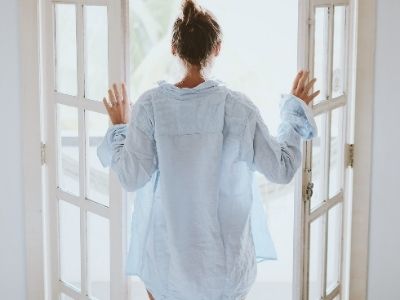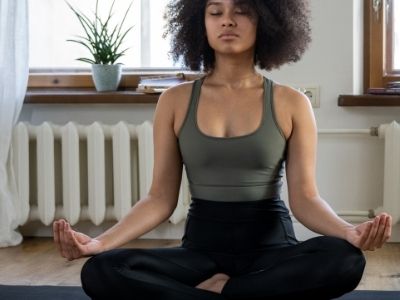Getting a good night’s sleep is important to our physical and mental well being, but can be hard to achieve. Unfortunately, once sleeping problems develop, they often become a vicious circle. Being unable to sleep at night causes distress and anxiety, which makes getting a restful night even more difficult. Bad sleep patterns can also be made worse by staying in bed late in the morning after a bad night. Breaking this cycle isn’t easy – you need try different strategies to find what helps you sleep best. There are 10 natural remedies for insomnia in this article which are very easy to put in place, so give them all a try and see what works best for you.
Finding what helps you sleep

You could try all the remedies below and then once you start to sleep better, drop the ones that you don’t feel are helping so much. Alternatively, you could try 3 or 4 remedies at a time to see what effect they have.
10 natural remedies for insomnia
- Get up and go to bed at the same time each day
- Don’t lay awake for more than 20 minutes
- Try to spend time outdoors every day
- Cut down on the amount of time you’re spending in bed
- Reduce your stress and anxiety during the day
- Stay calm about your insomnia
- Have a positive attitude after bad nights
- Avoid alcohol & caffeine close to bedtime
- Include good sources of tryptophan in your diet
- Have a relaxing “wind down” time before you go to bed
#1 Go to bed and get up at the same time every day

This helps your body clock get into a routine and know when it’s time to sleep.
#2 Don’t lay awake for more than 20 minutes
Get up and do a quiet activity that doesn’t involve looking at a screen. Lying awake thinking about your insomnia is distressing and not likely to help you drop back off. It also forms bad associations with being in bed. You need to form positive associations of restful sleep with your bed.
#3 Try to spend time outdoors every day

Ideally, do some walking or other exercise outdoors. Both exercising and being outdoors are good for mental and physical health and help to tire your body and relax your mind.
#4 Cut down on the amount of time you’re spending in bed
Aim to spend about 90% of your time in bed asleep. For example, if you are only currently sleeping 4 hours, then spend about 4.5 hours in bed. When you can sleep undisturbed for 4 hours, increase your time in bed to 5 hours. Then, when you can sleep well for around 4.5 hours, you can increase your time in bed again. Repeat the process until you are getting a full night’s sleep.
#5 Reduce your stress and anxiety during the day

Allowing stress and anxiety to build up during the day will make it hard to unwind and have restful sleep at night.Try relaxation techniques, meditation, having regular massage or vaporising relaxing essential oils.
#6 Stay calm about your insomnia
Remind yourself that your body can get by on a few hours sleep and that research has shown that people spend longer asleep than they think. Getting upset about the problem is only going to make it worse.
#7 Have a positive attitude after bad nights
After a bad night, don’t focus on how bad your lack of sleep is going to make you feel. Remind yourself that lack of sleep and a negative attitude is much worse than lack of sleep and a positive attitude.
#8 Avoid these foods and drinks close to bedtime

- Caffeine is a stimulant and it takes several hours for all traces of caffeine to leave the body, so it is best not to have any food or drink containing caffeine in the evening. Common caffeine-containing foods/drinks include coffee, tea, chocolate and cola.
- Alcohol is a depressant. It may help you to fall asleep initially, but can cause sleep disturbances later on in the night.
- High fat foods take a long time to digest and so shouldn’t be eaten close to bedtime.
#9 Include good sources of tryptophan in your diet

This amino acid is needed to make serotonin, which makes melatonin. Melatonin plays an important part in the sleep/wake cycle. Good sources of tryptophan include:
- Milk
- Yoghurt
- Bananas
- Tuna
- Turkey
- Seeds and nuts
#10 Have a relaxing “wind down” time before you go to bed
This should be time spent away from screens, including phones and should be a stress free time, doing something you find calming.
